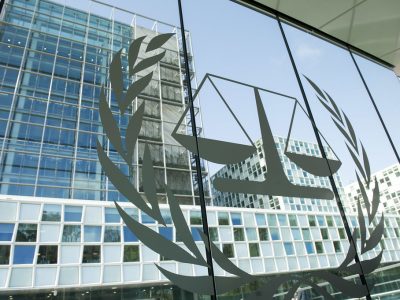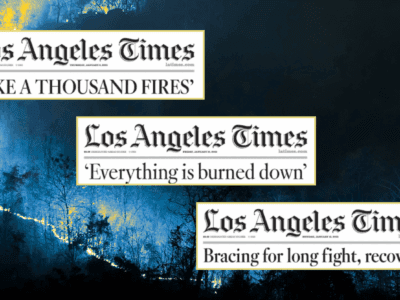Guest Contributor Kate Mackintosh: 200 Words to Save the Planet—The Crime of Ecocide
Could ecocide become the fifth crime to be prosecuted at the International Criminal Court?

Last month, a panel of international lawyers chaired by Philippe Sands and Dior Fall Sow launched our proposal for a new crime of ‘ecocide’ – an international crime of environmental destruction that would sit alongside genocide, crimes against humanity, war crimes and the crime of aggression at the International Criminal Court.
The idea of ecocide dates back to the 1970s and the Vietnam War, but the acceleration of the climate crisis has given it new impetus and resonance even among nation states, a number of whom have already shown interest. Should the crime be adopted, individuals falling under the jurisdiction of the Court could be prosecuted for acts meeting the standard, bringing a level of personal accountability that should significantly change the behavior of decision-makers in government and industry.
International crimes are crimes of a gravity that triggers international concern, and which cannot be left to the exclusive jurisdiction of the state or states that would normally have authority to prosecute. The principle is best encapsulated in the idea of ‘crimes against humanity’: a crime which, wherever committed, is a crime against the whole human race. The concept of crimes against humanity was born at Nuremberg, where it joined the established war crimes and crimes against peace (or ‘aggression’) in the Charter of the International Military Tribunal. Soon after, in 1946, the new international crime of genocide was encapsulated in a treaty. The International Criminal Court in The Hague (ICC) has jurisdiction over these four established international crimes: genocide, war crimes, crimes against humanity and aggression. Ecocide would be the fifth.
Severe damage to our environment fulfills these criteria for an international crime. The fact that actions in one nation, or in many, affect people across the globe, argues for the kind of universal jurisdiction which international criminal law introduces. And although it may be slower than a genocide or traditional act of aggression, environmental destruction poses the same existential threat. The ICC can already prosecute widespread, long-term and severe damage to the environment as a war crime under article 8(2)(b)(iv) of its Statute, under certain circumstances, in international armed conflict. The other ICC crimes can only address environmental harms which result in or accompany those core crimes. For example, it would be possible to prosecute destruction of the Amazonian rainforest as genocide if it could be established that the destruction was intended to destroy an ethnic group as such (this claim has been made, but it’s a tough one). Or to prosecute the toxic metal poisoning of the citizens of Cerro de Pasco in Peru as a crime against humanity if that could be characterized as a widespread and systematic attack on a civilian population. Most serious environmental damage, however, is simply not caught by any existing definition of an international crime.
Which is why a new crime is needed. Drawing on established notions of international criminal law, the drafting panel has come up with the following definition:
Ecocide
- For the purpose of this Statute, “ecocide” means unlawful or wanton acts committed with knowledge that there is a substantial likelihood of severe and either widespread or long-term damage to the environment being caused by those acts.
- For the purpose of paragraph 1:
- “Wanton” means with reckless disregard for damage which would be clearly excessive in relation to the social and economic benefits anticipated;
- “Severe” means damage which involves very serious adverse changes, disruption or harm to any element of the environment, including grave impacts on human life or natural, cultural or economic resources;
- “Widespread” means damage which extends beyond a limited geographic area, crosses state boundaries, or is suffered by an entire ecosystem or species or a large number of human beings;
- “Long-term” means damage which is irreversible or which cannot be redressed through natural recovery within a reasonable period of time;
- “Environment” means the earth, its biosphere, cryosphere, lithosphere, hydrosphere and atmosphere, as well as outer space.
Established notions: The format of the crime mimics that of article 7 of the ICC Statute, crimes against humanity, with a short definition paragraph followed by a paragraph defining core terms. The qualifiers ‘severe’, ‘widespread’ and ‘long-term’ are familiar from existing international law protecting the environment in armed conflict – the ENMOD Convention, and Additional Protocol I to the Geneva Conventions – and appear in the current Statute’s war crime protecting the environment. The definitions of those terms also draw on these sources, although with modifications. The terms ‘wanton’ and ‘unlawful’ appear together in the war crime of destruction of property: article 8(2)(a)(iv) in the ICC Statute and a grave breach of the Geneva Conventions.
Two thresholds: The text introduces two threshold tests. First, acts must be committed with knowledge that there is a substantial likelihood of severe and either widespread or long-term damage to the environment. Under the second test, the acts must be either unlawful or ‘wanton’. Unlawful is not defined further, leaving open the question of whether national law, international law or both are meant. This is deliberate. There are so few hard prohibitions in international environmental law that relying on international law alone would let too much through the net. Most firm rules are made at national level. If a prosecutor can point to a law that has been violated, the second threshold will be satisfied. At the same time, national law cannot be the only criterion. National laws are unequal, and may be inadequate, across the globe. If an act is lawful but completely out of proportion to any economic or social benefit anticipated, it is considered ‘wanton’, and caught under this second leg of the test. This element is particularly important to capture – or better, to deter – acts not yet prohibited but in blatant violation of the principles of sustainable development.
Endangerment: Notably, the criminal act consists of creating a dangerous situation, rather than actually producing the effects. The unlawful or wanton acts must be committed with the knowledge that there is a substantial likelihood of them causing severe and widespread or long-term damage. This endangerment liability, with its emphasis on prevention, features in other international crimes. From the prosecutor’s point of view, it means that there is no requirement to prove but-for causation, which is important in a number of areas, not least climate change. Culpability attaches to proceeding to act (or failing to act) in full knowledge of the risk.
Prospects: How likely is it that ecocide will enter the Rome Statute as the fifth international crime? In its favor, the fact that the crime is crafted from existing international law and concepts, which will be familiar to states and their legal advisers. Against it, perhaps, is the experience of current amendments to date, the most significant of which – the activation of the Crime of Aggression – took another 7 years after the text of the crime was agreed. An assembly of 123 states parties is unlikely to move very fast. However, there are signs that the time might be right for a move which would have seemed laughably utopian just a few years ago. There has been significant governmental interest in our work, and supportive statements about a new crime of ecocide have been made at each annual meeting of member states of the court for the past two years. Meanwhile the prestigious European Law Institute has launched a program to advance ecocide at the European level. And a wide range of media have covered the definition launch, reflecting broad public interest.
Our goal on the panel was to produce a practical and legally credible text that could kick start the conversation at international level. We will be watching closely to see what happens next.
Kate Mackintosh is the executive director of the Promise Institute for Human Rights at UCLA School of Law, and Deputy Co-Chair of the Ecocide Drafting Panel. She also chairs a working group on international criminal law and the protection of the environment at the Promise Institute. Several UCLA Law students contributed research to the working group and Panel, including Amanda Brown ‘20, Lydia Heye ‘22, Hannah Seulgee Jung ‘20, Prashant Khurana ‘20, and Ashley Sykora ‘21. Find out more at ecocidelaw.com.
Reader Comments
4 Replies to “Guest Contributor Kate Mackintosh: 200 Words to Save the Planet—The Crime of Ecocide”
Comments are closed.







Dear Ms. Mackintosh,
I support your goal and I support your idea of creating an international ecocide crime. I have often thought that the Climate Crisis is the greatest crime against life on this planet in the history of mankind. But the obvious complication is that millions of not billions of people are guilty of this crime as they contribute their own carbon waste into the biosphere. How can we write up a crime in which we are ALL guilty?
That is a great point, Bill. The idea would be to screen out small scale individual contributions with the first threshold test: damage likely to be caused must be severe and either widespread or long-term. This is designed to catch only the really significant contributions or systemic actors.
In the US [and probably the EU] there is no lack of legal authority to deter and prevent most pollution. What is lacking is the political will and integrity in government enforcement agencies to do their job to prevent pollution [more]. In most pollution cases, enforcers have ample evidence, statutory authority and agency enforcement resources. Typically, federal and state governments refuse to bring criminal cases; notwithstanding the evidence, they refuse to bring the polluters to trial and instead, they offer polluters caught ‘dead to rights’ ‘slap on the wrist’ civil settlements. This allows knowing and intentional criminally liable big polluters to the save much larger costs and unpleasant embarrassments of a jury trial and, potentially, jail time. Why does the government lack the political will to enforce adequately, to bring criminal polluters to trail? Again, this ilack of political will is not due to a lack of evidence or insufficient legal authorities. It is due to the unrestricted influence and power of polluter corporations in the halls of government. Pollution on the current gigantic scale will continue until this influence and power is outlawed.
International criminal law can offer an alternative accountability mechanism, as it is not dependent on the political will you reference. In fact, the International Criminal Court can only proceed with an investigation if the national authorities are either unwilling or unable to investigate and prosecute the crime themselves. It is precisely designed to fill that gap.